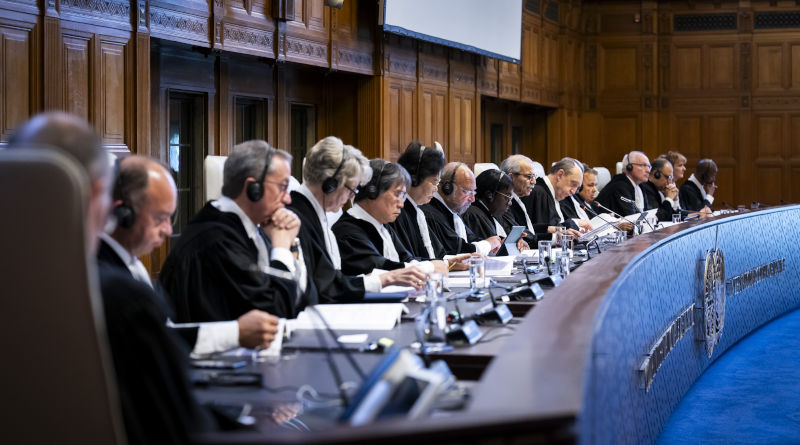The ICJ decision and the general assembly
August 20, 2024
Readers note that it is a month since the International Court of Justice (ICJ) handed down its advisory opinion on the Palestinian occupation (on 19 July). No doubt some are wondering what is happening. I am one of you.
We are aware of course that the Australian Government has done next to nothing: refer The ICJ decision – where to from here? and Apartheid Israel. Might it be that our government is awaiting any action of the General Assembly which sought the Advisory Opinion? Well, possibly, in which case it is appropriate to ascertain whether that body has done, or is doing, something. But it is also appropriate to consider what other States may have done in response to the Opinion, and ask whether Australia is justified in delaying its response.
First then, has the General Assembly done anything? Searching the UN’s Media Centre reveals that an early media release, on 22 July, noted that the Court stated that “the United Nations, and especially the General Assembly, which requested this opinion, and the Security Council, should consider the precise modalities and further action required to bring to an end as rapidly a possible the unlawful presence of the State of Israel in the Occupied Palestinian Territory”.
That media release was put out by the UN Independent International Commission of Inquiry on the Occupied Palestinian Territory including East Jerusalem (the Commission). Beyond advising that the Commission intended to assist the General Assembly and the Security Council in determining appropriate modalities and actions, by reporting on the implications of the opinion, the Commission appears to have not advanced the matter as yet.
On 30 July, the UN published a statement by 38 UN independent human rights experts who had been appointed by the UN Human Rights Council in Geneva. The experts stated, “The advisory opinion reaffirms peremptory norms prohibiting annexation, settlements, racial segregation and apartheid, and should be seen as declaratory in nature and binding on Israel and all States supporting the occupation”. Further, it “will serve as a critical tool to restore a respect for international law”. The statement continued that “while the UN Security Council and General Assembly will consider strategies to ensure a swift end to the illegal occupation…States must immediately review all diplomatic, political, and economic ties with Israel, inclusive of business and finance, pension funds, academia and charities”. The experts called for action, including an arms embargo and targeted sanctions, as well as investigations and prosecutions against those involved in crimes in the Occupied Palestinian Territory, particularly dual citizens serving in the Israeli military or involved in settler violence. “The Court’s findings should also be widely disseminated to ensure that the illegality of Israel’s presence in the occupied territory is fully understood at all levels of the government and reflected in public documents and education systems”, they said.
So, we presumably must wait further for the foreshadowed ‘strategies’.
I turn then to consider what other States may have done since 19 July to discharge any perceived responsibilities. Well, there is some talk of the UK suspending some arms exports to Israel. But not much has happened there. Canada has apparently revoked the charitable status under Canadian law, of the Jewish National Fund of Canada, which had a practice of supporting infrastructure projects for the Israeli Defence Force. Of course, the US has simply ignored the opinion, and has carried on regardless with its provision of munitions. Our Western press probably has not reported on what other, responsible, countries, may have done.
Australia has done next to nothing – except sanctioning some seven violent settlers in the West Bank. There are some obvious things that it could do. It could issue a clear statement as to the importance of the ICJ advisory opinion. It could review all government investments, and super fund investments, and disinvest from any Israeli institutions. Further, it should advise Australian companies and individuals to do the same. It should certainly terminate any defence contracts with Israeli defence companies. It could discourage/disallow, academic, artistic, and sporting contacts. It could recall Australia’s ambassador and withdraw recognition of Israel’s ambassador to Australia. Finally, and perhaps most importantly, it can recognise a Palestinian State. Why it cannot do so is, no doubt, beyond the ALP rank and filers who have called for such action.
And supporters of Israel should not be too concerned. When Israel announces that it intends to comply with the ICJ advisory opinion, and commences to do so, Australia can commence to undo all measures that have been taken. Indeed, Australia could immediately seek confirmation from Israel that it will comply with the Court’s orders. We know what the response will be, but it can’t hurt to go through the motions.
I imagine that many of us grew up assuming that Australia was a good international citizen, setting an exemplary example for other countries. I have no doubt that a great number of us are now ashamed of our country’s response to the ICJ opinion, and wonder where we went wrong, and how we became beholden to the rogue state, Israel, and indeed, compromised our sovereignty to it and its Zionist supporters.
